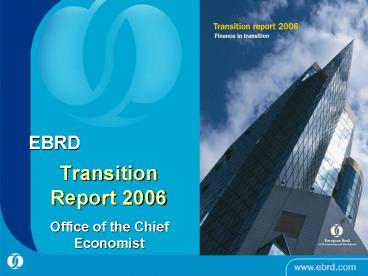Transition Report 2006 - PowerPoint PPT Presentation
1 / 23
Title:
Transition Report 2006
Description:
Initial Reforms: small-scale privatisation, price and trade liberalisation ... Speed up privatisation and restructuring of large companies ... – PowerPoint PPT presentation
Number of Views:18
Avg rating:3.0/5.0
Title: Transition Report 2006
1
Transition Report 2006
EBRD
- Office of the Chief Economist
2
Overview Transition Report 2006
- Part I Transition in 2005-06
- Transition is often driven by markets, rather
than governments - Strong macro performance, fuelled by consumption
and high commodity prices - Part II Finance in transition
- Financial markets have grown in size and
complexity - But because of institutional constraints they
remain underdeveloped
3
Overview Serbia in 2005/06
- Further progress in reform, allied to strong
macroeconomic indicators - Regional leader in growthbut from a low base
- Significant macroeconomic and structural
imbalances remain a large reform agenda still
lies ahead post-elections
4
EBRD Transition Indicators
- Scale 1 little/no progress 4 standards of
advanced market economy - Initial Reforms small-scale privatisation, price
and trade liberalisation - Institutional Development large-scale
privatisation, governance, competition,
infrastructure, banks, and non-bank financial
institutions
5
Progress in transition by country
Number of upgrades in 2006
6
Stage of transition 2006
CEB
SEE
CIS
Average transition score, 2006
7
Progress in transition by sector
Number of upgrades in 2006
8
The regions macroeconomy continued strong
growth in 2005/06
Per cent
Source EBRD and IMF estimates
9
SEE fresh wave of FDI
- Strong growth in 2005-06
- Prospects of EU accession attracting record
inflows of FDI, mainly due to privatisations and
bank acquisitions - No deterioration in fiscal position and inflation
is generally under control, but government
spending is large relative to GDP - Large current account deficits could pose a
problem if remittances or FDI slow down
Net Foreign Direct Investment
Billion USD
SEE-3 Bulgaria, Croatia, Romania SEE-5
Albania, Bosnia-Herzegovina, FYR Macedonia,
Montenegro, Serbia
10
Special theme - Finance in Transition
- Financial sectors have grown in size and
complexity but remain underdeveloped further
institutional reforms still needed - Financial sector development is linked to GDP
growth - Entry of foreign banks has had a positive impact
on efficiency and stability of banking systems - Access to bank finance remains problematic for
many firms, particularly SMEs - Non-bank sector is now growing, including private
equity. Private equity funds can play a positive
role in restructuring firms
11
Financial markets are growing
Per cent of GDP
Domestic credit to private sector
Stock market capitalisation
12
Finance and economic growth
- Evidence from large number of countries for
1994-2003 suggests significant gains for
transition countries from advancing financial
development - Transition countries could increase growth in
industrial output by up to 1.4 per year by
raising financial development to that of top 25
of countries - Largest gains likely in countries with low
initial levels of financial depth
13
Banks are lending to a diverse range of
borrowers, including households
CEB
CIS
SEE
Source Banking environment and performance
survey (EBRD)
14
Bank performance
- Foreign owned banks have become increasingly
important players - Institutional factors (laws, courts, regulations
etc.) have also been important in explaining
costs - Insights from EBRDs Banking Environment and
Performance Survey (BEPS) conducted in 2005 with
a sample of 220 banks in 20 countries
15
New foreign banks grow faster
Foreign banks have better portfolios than
domestic banks
Per cent
Source Banking environment and performance
survey (EBRD) and Bankscope
16
Foreign, large banks focus on consumer credit
While domestic, small banks focus on SMEs
Per cent
17
Firms still lack access to credit
Small enterprises and CIS firms are especially
constrained
Per cent of firms unable to obtain bank loans
Germany
Source EBRD/ World Bank Business Environment and
Enterprise Performance Survey 2005
18
The emergence of non-bank finance
- Public equity markets have grown significantly,
although they still remain quite small and often
illiquid - Unique EBRD data relating to 44 funds with 450
investments show that private equity has also
begun to emerge from the shadows - Private equity can play an important role in
restructuring firms and improving performance - Private equity can also support the development
of know-how and expertise
19
The emergence of private equity
US Million
20
Performance of private equity funds
- Returns have increased rapidly in recent years
due to better exit and investment opportunities - Large funds, diversified funds provide better
returns - Returns comparable to private equity funds in EU
- Most funding comes from abroad limited domestic
interest thus far in providing private equity
finance - Restructuring of firms by private equity funds
particularly changes in management - has been
associated with improved returns
21
Conclusion the region
- Progress in reform has been maintained, allied to
strong economic growth - Financial markets have also grown in size,
complexity and stability - Public and private equity markets have emerged
but bank-based systems dominate - Potentially large growth dividend from further
financial deepening
22
Serbia the challenges ahead
- Speed up privatisation and restructuring of large
companies - Implement legislation to promote enterprise
performance - Get back on track with SAA process
- Balance carefully infrastructure investment needs
with prudent monetary and fiscal policy
23
- For further information visit
- http//www.ebrd.com/economics

